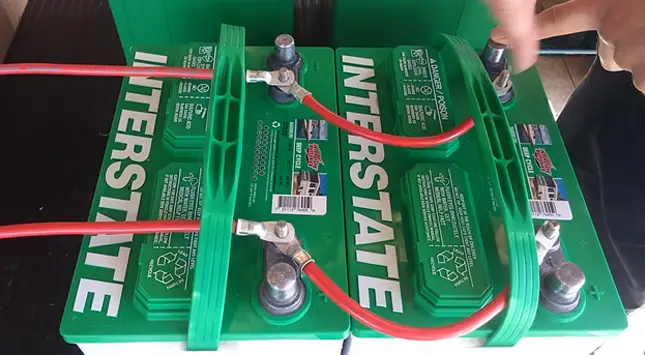Last Updated on April 17, 2023
If you own an RV, then you know that having a well-functioning battery is essential. Battery cables are responsible for carrying electrical current from the battery to the RV’s various electrical components.
If the cables are too small, they will not be able to handle the electrical load, which can lead to fires or other damage. What size battery cable for RV? It depends on a few factors, including the type of RV you have and the size of your battery.
In general, most RVs will require a 4-gauge cable for the main battery connection and a 6-gauge cable for the secondary connection. By using the proper size cables, you can help ensure that your RV’s electrical system is running safely and efficiently.
What Size Battery Cable for RV : Must Know
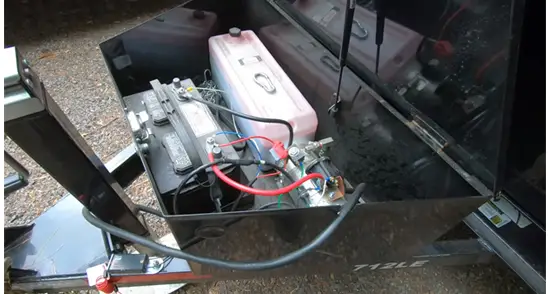
If you own an RV, one of the most important things you need to know is what size battery cable to use. There are a few things you need to take into account when choosing a battery cable for your RV. First, you need to consider the length of the cable.
Determine The Size of The Cable for RV Batteries
As it pertains to choosing an appropriate cable, there are a variety of factors that go into selecting the appropriately sized cable. Consider any obstacles that may be in the way. If you’re not careful, you might never get your RV started again.
Determining the length of the run is important because it will help you estimate how much voltage drop there is across the cable. The longer the run, the more voltage drop there will be; as a result, less current can flow along the cable.
The next consideration is the current flow that will be transmitted through the cable. You need to ensure the cable can handle how much electricity your RV will draw. If you are not sure how much current your RV will be drawing, you can use an online calculator to help you determine the correct size cable.
The last factor is the distance between the battery and the device. Ensure the length so that it can reach the device. If the cable is too short, you will not be able to properly connect the device.
Different Types of Battery Cables Available
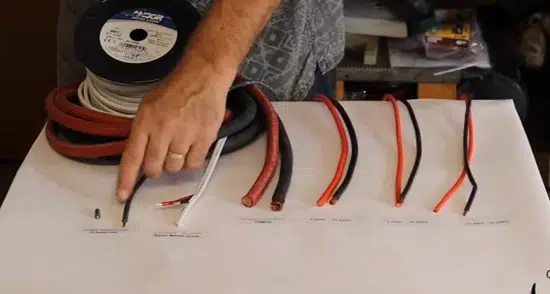
It is necessary to know the total amp hours of your battery bank in order to determine the cable size for RV batteries. A battery’s amp hours represent its capacity to store energy. The amp hours can be calculated by multiplying the number of batteries in your bank by the amp hours.
In order to choose a cable that can handle the current, you will need to know the total amp hours. Gauge measures the size of a cable. A thinner cable has a higher gauge. The most common battery bank cable is 12 gauge. You may need to use an 8-gauge cable if you have a very large bank or expect to use high currents.
You will need to choose a wire that is long enough to reach from the battery to the RV’s electrical system. The longer the battery cable, the more resistance it will have. This means that you’ll need to use a thicker gauge cable for longer runs.
Gauge refers to the thickness of the wire. A thicker wire carries more current and is less susceptible to cause overheating. For example, a 10-gauge cable would be sufficient for a short run, but you would need to use an 8-gauge cable for a longer run.
Finally, you need to determine the amp rating of the cable. The amp rating is the maximum amount of current that the cable is capable of drawing. This is important because you don’t want to overload the cable and cause a fire. For most RVs, a 30-amp cable is sufficient.
Now that you know the basics of choosing the ideal battery cable, make an informed decision about what will work for you. Just remember to take into account the type of battery you have, its runtime capacity, and the amp rating before making your final decision.
Installation Tips for a New Battery Cable In Your RV
There are a few factors to consider when choosing a battery cable. Wire thickness and cable type are just as significant as the cable size. The cable size refers to the diameter of the wire. Bigger batteries require longer cables. It is possible to get away with a smaller cable if you have a small battery.
The kind of battery cable is also important to consider. More two options: stranded and solid. Stranded cables are made up of multiple small wires twisted together.
They’re more flexible than solid cables, but a little more expensive. Solid cables are made of a single piece of wire. They’re less flexible than stranded cables, but they’re also cheaper.
The gauge of the battery cable is how thick it is. Thicker wires can carry more current. A thicker cable will be able to power more devices than a thinner one.
Keep these factors in mind. Choose the appropriate size, type, and gauge of cable to make sure your RV has the power it needs.
How to Take Care of Your Battery Cables?
Battery cables are important parts, and it’s important to take care of them to extend their lifespan. Here are a few tips on how to do just that:
- Keep the cables clean and dry: Dirty or wet cables can corrode and short out, so make sure to keep them clean and dry.
- Inspect the cables regularly: Check for signs of wear and tear, and replace them if necessary.
- Don’t over tighten the connections: This can damage the cables and cause them to fail prematurely.
- Use dielectric grease on the connections: This will prevent corrosion and make it easier to remove the cables if necessary.
- Store the cables properly: When not in use, store the cables in a dry, protected place. This will help to stop damage and extend their life.
- Don’t use damaged cables: If the cables are damaged, replace them immediately. Using damaged cables can cause serious electrical problems.
- Inspect the battery frequently: In addition to inspecting the cables, it’s also important to monitor and maintain the battery regularly. Look for symptoms of corrosion or damage, and clean or replace the battery as necessary.
By following these simple tips and manufacturer’s instructions for your particular make and model of vehicle, you can extend the life of cables and keep your vehicle’s electrical system running in top condition smoothly.
What gauge wire is used for RV batteries?
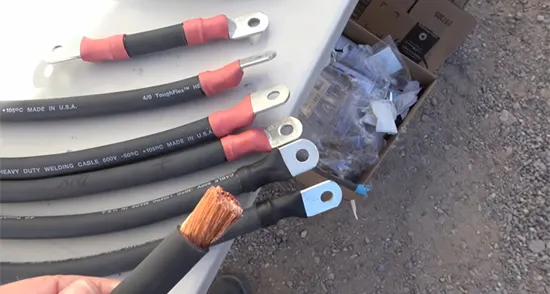
When connecting batteries in an RV, it is vital to connect the correct gauge wire. Any RVer knows that having a reliable set of batteries is essential for hitting the open road. With so many different types and sizes of batteries, you may not be sure which one is right for your RV.
The thicker wire gauge is better because it can carry more current without overheating, making it ideal for high-powered RV applications. Black and white wires are the most commonly used gauge wires for RV batteries. The black wire is usually the negative one while the white wire is positive.
They are typically used because they offer a good balance between current carrying capacity and voltage drop. Red and green are also very popular colors for these types of wires. These wires are commonly used for applications requiring higher current, such as in electric vehicles or RVs having many batteries.
There are also other sizes such as eight, ten, and twelve-gauge wire that can be used, but they are not as popular as the black and white ones. These gauges are commonly used in very high current applications, such as in industrial settings or for starting engines.
For most RV batteries, a 10-gauge wire is sufficient. Particularly large batteries or are using high-powered appliances, and you may need to upgrade to an 8-gauge wire. No matter what type of RV battery you have, always make sure to use the thickest wire possible to ensure safe and reliable operation.
Precautions for Connecting RV Battery Cables

Cables for RV batteries are not just for connecting batteries. They can also be used to connect a generator to the RV or to connect the RV to a tow vehicle. When using RV battery cables for any of these purposes, you should take some precautions, to avoid damage to either the RV or the equipment being powered.
Determining the proper length of battery cable on an RV is important, as is choosing the right type of cable. There are several factors to consider when making these decisions. The first is the size of the cable. From small-gauge cables to larger ones. The size you choose will depend on the amount of power you need to be able to transfer.
Battery cables come in varieties: primary and secondary. Primary types are used to power the RV battery to the generator, while secondary ones connect it to the tow vehicle.
Consider the amperage capacity of the cable. This will determine how much power can pass through the cable. Choose a cable with a higher amperage rating if you plan on using it for high-powered equipment, such as an RV air conditioner.
Installing a battery wire in your RV is not difficult, but there are a few things to keep in mind. First, check that the area where you will be installing the cable is clean and free of debris. Second, use a cable clamp to secure the cable to the battery terminal.
Connect the positive (red) and negative (black) leads to the positive and negative terminals on the battery, respectively. Be sure to tighten the terminals securely so that the connection is good. Finally, route the cable away from any moving parts, so it will not be damaged.
Once you have installed your RV battery cable, it is important to look after it to extend its lifespan. Make sure to clean the terminals regularly, using a brush and some battery terminal cleaner.
Inspect the cable regularly for any signs of damage. If you see any fraying or cracks, replace the cable immediately. Finally, when it is not being used, store it in a cool, dry place, out of the sun.
7. FAQs
1. What are the risks of using too small or too large of a battery cable?
The results of connecting the wrong size wires can be a serious risk. Too small cables can create a voltage drop, which can damage electronic components and cause starting and charging problems. Too large cables can overheat, creating a fire hazard.
Use the correct size battery cable to avoid potential problems. With a properly sized battery cable, you can help ensure your vehicle’s safety and performance.
2. Is it necessary to use a battery wire specifically designed for RVs?
It is advisable to use a cable that is specifically designed. These cables are typically thicker and more durable, which helps to prevent voltage loss and ensure optimal performance.
RV battery cables are often equipped with special features, such as waterproofing and built-in circuit protection, that can further improve safety and reliability. Using the right battery cord for your RV is essential for ensuring trouble-free operation.
3. What are the consequences of getting the wrong size battery cord for your RV?
You should use the right length battery cable when wiring them up. When the gauge for the wire is too small, it can cause a voltage drop, so less power reaches the battery, and it has to work harder to recharge.
This puts undue strain on the battery and can shorten its lifespan. In extreme cases, using too small a gauge cable may result in a fire.
Don’t use oversized terminals when connecting the cables to the battery. If they are too small, they can overheat and melt, which can create a dangerous situation. So when it comes time to wire up your RV battery, make sure you pick the right size cable and terminals for the job.
4. How can you tell if you’re using the right size battery cable for the RV?
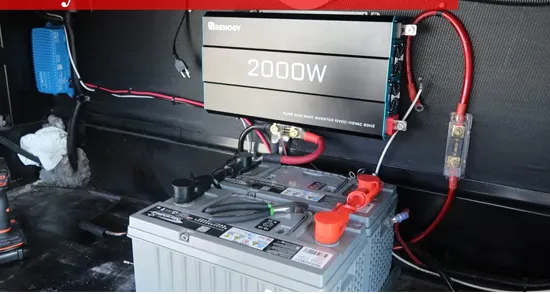
One way to tell is to determine the amperage capacity of the cable. The amperage rating is usually printed on the side of the cable. Make sure that the amperage capacity is higher than the rated amperage of your RV’s battery. For example, if your RV’s battery output is 30 amps, then you should use a battery cable with an amperage rating of 40 amps or higher.
Another way is to check the gauge of the wire. The gauge is a measure of how thick the wire is. The thicker the wire, the higher the gauge number will be. For example, a 12-gauge wire.
5. Is it important to use a bigger battery cable if you have a larger RV?
It is essential that you use larger cables for bigger RVs. The increased size will allow for more efficient power transfer, and it will also help to avoid voltage drop. Will also provide greater resistance to heat and vibration, ensuring the electrical system of your RV remains functional even when the going gets tough.
Batteries with larger cables will handle more current and will be less likely to overheat. Less likely to get damaged or eaten by rodents. So if you’re looking to get the most out of an RV’s electrical system, be sure to upgrade to a larger cable.
Conclusion
As you can see, there are a few things to take into consideration when you search for “What Size Battery Cable for RV”, that we covered in this post. We went over the importance of using the appropriate size battery cable, how to determine the right size and some of the consequences of using an incorrect-sized cable.
With this information, you can select the perfect battery cable for your needs and be confident that your RV’s electric component stays up and running for a long time. In case of doubt, always go with a larger battery cable. It’s better to be safe than sorry when it comes to your RV’s electrical system. Thanks for reading.

